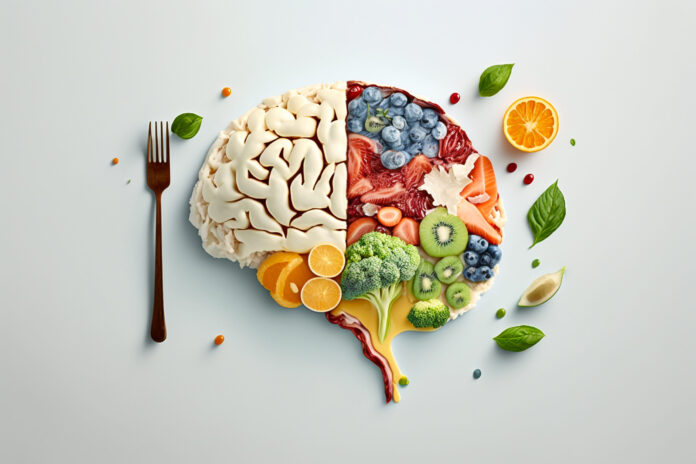Our brains, much like the rest of our bodies, require specific nutrients to function optimally. The right diet can significantly impact cognitive function, memory, and overall mental health. Let’s explore the essential nutrients and foods that can help boost your brainpower and enhance mental performance.
1. Omega-3 Fatty Acids: The Brain’s Building Blocks
Omega-3 fatty acids, particularly DHA (docosahexaenoic acid) and EPA (eicosapentaenoic acid), are crucial for brain health. These fats are vital components of cell membranes in the brain and have been linked to improved cognitive function and reduced risk of cognitive decline.
Sources:
- Fatty Fish: Salmon, mackerel, sardines, and trout are rich in omega-3s. Consuming these fish at least twice a week can help maintain optimal levels.
- Plant-Based Options: For vegetarians and vegans, flaxseeds, chia seeds, and walnuts provide ALA (alpha-linolenic acid), a type of omega-3 fatty acid that the body can partially convert into DHA and EPA.
2. Antioxidants: Protecting the Brain from Oxidative Stress
The brain is highly susceptible to oxidative stress, which can damage brain cells and impair function. Antioxidants help neutralize free radicals, protecting the brain from damage and supporting cognitive health.
Sources:
- Berries: Blueberries, strawberries, and blackberries are packed with antioxidants, particularly flavonoids, which have been shown to improve memory and cognitive function.
- Dark Chocolate: Rich in flavonoids, dark chocolate can enhance cognitive function and improve mood. Opt for chocolate with at least 70% cocoa content to maximize benefits.
- Leafy Greens: Spinach, kale, and Swiss chard are loaded with antioxidants and other essential nutrients that support brain health.
3. B Vitamins: Essential for Brain Function
B vitamins, especially B6, B12, and folic acid, play a crucial role in brain function. They help produce neurotransmitters, which are chemicals that transmit signals in the brain. These vitamins also assist in maintaining healthy nerve cells and reducing levels of homocysteine, an amino acid linked to cognitive decline.
Sources:
- Whole Grains: Brown rice, oats, and whole wheat are excellent sources of B vitamins.
- Eggs: Particularly high in B12, eggs also contain choline, a nutrient that supports memory and cognitive function.
- Legumes: Beans, lentils, and chickpeas are rich in B vitamins and fiber, supporting overall brain health.
4. Vitamin E: Defending Against Cognitive Decline
Vitamin E is another potent antioxidant that helps protect brain cells from oxidative damage. Studies have shown that higher vitamin E intake is associated with a reduced risk of cognitive decline, especially in the elderly.
Sources:
- Nuts and Seeds: Almonds, sunflower seeds, and hazelnuts are rich in vitamin E.
- Vegetable Oils: Sunflower and safflower oils are good sources of vitamin E.
- Avocados: Besides being rich in healthy fats, avocados also provide a good amount of vitamin E, promoting brain health.
5. Choline: Supporting Memory and Learning
Choline is an essential nutrient that is crucial for brain development and function. It plays a significant role in producing acetylcholine, a neurotransmitter involved in memory and learning.
Sources:
- Eggs: One of the richest sources of choline, eggs are excellent for supporting brain health.
- Cruciferous Vegetables: Broccoli, Brussels sprouts, and cauliflower are also good sources of choline.
- Lean Meats and Fish: Chicken, turkey, and certain fish like cod provide ample amounts of choline.
6. Polyphenols: Enhancing Brain Function
Polyphenols are micronutrients that have been shown to improve brain function and protect against neurodegenerative diseases. They enhance brain function by improving blood flow to the brain and promoting synaptic plasticity, the brain’s ability to adapt and learn.
Sources:
- Green Tea: Rich in polyphenols and caffeine, green tea improves brain function and mental alertness.
- Coffee: Contains caffeine and antioxidants, both of which enhance cognitive function and reduce the risk of neurodegenerative diseases.
- Fruits and Vegetables: Apples, onions, and grapes are particularly high in polyphenols, contributing to overall brain health.
7. Magnesium: The Relaxation Mineral
Magnesium plays a crucial role in many neurological functions, including the regulation of neurotransmitters. It helps relax nerves and muscles, supports energy production, and has been linked to improved mood and reduced anxiety.
Sources:
- Dark Leafy Greens: Spinach, kale, and Swiss chard are excellent sources of magnesium.
- Nuts and Seeds: Almonds, pumpkin seeds, and sunflower seeds are also rich in magnesium.
- Whole Grains: Brown rice, quinoa, and oats provide a good amount of magnesium, contributing to overall brain function.
8. Hydration: The Foundation of Brain Function
Staying hydrated is essential for optimal brain function. Even mild dehydration can impair concentration, memory, and mood. The brain is about 75% water, so maintaining proper hydration is key to keeping cognitive functions running smoothly.
Sources:
- Water: The most straightforward and effective way to stay hydrated. Aim for at least eight glasses of water per day.
- Hydrating Foods: Fruits and vegetables with high water content, such as cucumbers, oranges, and watermelon, can also help maintain hydration levels.
Conclusion
Incorporating these brain-boosting foods into your diet can help enhance cognitive function, improve memory, and protect against mental decline. Remember, a balanced diet rich in fruits, vegetables, whole grains, healthy fats, and lean proteins is crucial for overall brain health. Making mindful food choices today can lead to a sharper, healthier mind tomorrow.

